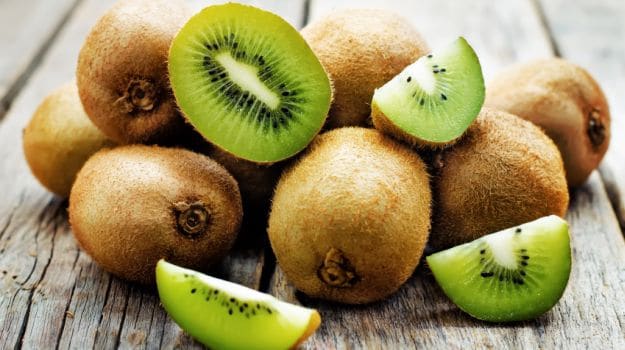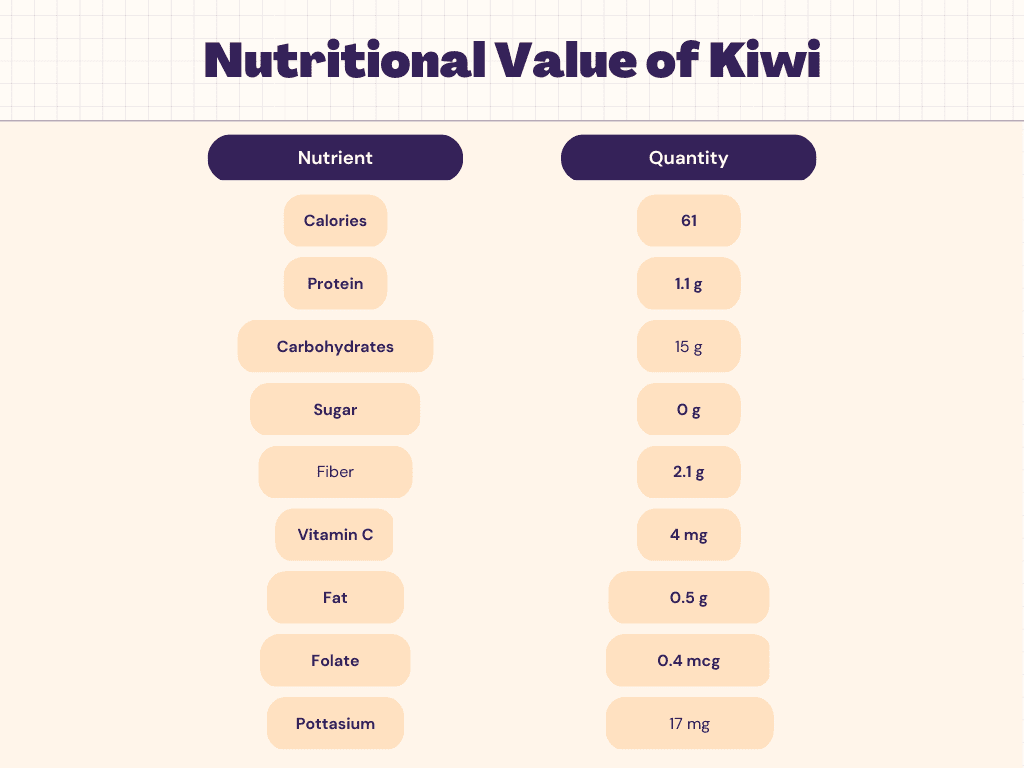Kiwi is a small but mighty fruit that is packed with essential nutrients and health benefits. While often overlooked in favor of more well-known fruits, kiwis are a rich source of calories, protein, and carbohydrates, making them an excellent addition to any healthy diet. In this article, we will explore the nutritional value of kiwis, including their calorie content, protein content, and carbohydrate content, as well as other important vitamins and minerals that make this fruit such a valuable part of a healthy lifestyle. Whether you’re a fitness enthusiast looking to boost your performance or simply seeking to improve your overall health, kiwis are an excellent choice for a nutritious and delicious snack.
Nutritional Value of Kiwi
Nutritional Facts of Kiwi
Carbs In Kiwi
Kiwi is a fruit that is relatively low in carbohydrates, making it a great option for those following a low-carb or ketogenic diet. One medium-sized kiwi contains approximately 15 grams of carbohydrates, including 2.1 grams of fiber and 9.2 grams of natural sugar. The fiber in kiwi helps slow down the absorption of sugar into the bloodstream, which can help prevent blood sugar spikes and promote better blood sugar control. Additionally, the low glycemic index of kiwi makes it a suitable fruit for people with diabetes. Kiwi also contains a variety of vitamins and minerals, which can further support healthy blood sugar levels and overall health. Overall, the moderate carbohydrate content of kiwi makes it a nutritious and delicious addition to a healthy diet.
Protein In Kiwi
While kiwi is not a significant source of protein, it does contain a small amount of this macronutrient. One medium-sized kiwi contains approximately 1.1 grams of protein. While this may not seem like much, it can still contribute to your daily protein needs, particularly if you consume multiple kiwis throughout the day. Protein is important for building and repairing tissues, maintaining muscle mass, and supporting healthy immune function. Additionally, the protein in kiwi is accompanied by a range of other essential nutrients, including vitamins C and K, fiber, and potassium, which can further support overall health and well-being. While kiwi should not be relied upon as a primary source of protein, it can still provide a nutritious boost to your diet.
Health Benefits Of Kiwi
Kiwi is a nutrient-dense fruit that offers a range of health benefits. Here are some of the key health benefits associated with consuming kiwi:
- Supports immune function: Kiwi is rich in vitamin C, which is a potent antioxidant that can help boost the immune system and protect against oxidative stress.
- Promotes healthy digestion: The fiber in kiwi can help promote regular bowel movements and prevent constipation. Additionally, kiwi contains enzymes that can help break down protein, improve digestion and promote weight loss. Check our Weight Loss Plans here.
- Supports heart health: The potassium in kiwi can help regulate blood pressure and reduce the risk of heart disease. Additionally, the fiber in kiwi can help lower cholesterol levels, reduce the risk of heart disease, and regulate blood sugar levels to control type 2 Diabetes. Check our Diabetes Plans here.
- Enhances skin health: The vitamin C in kiwi can help promote collagen production, which is essential for healthy skin. Additionally, the antioxidants in kiwi can help protect the skin against free radical damage and promote a more youthful appearance.
- May improve sleep quality: Kiwi contains a compound called serotonin, which has been shown to improve sleep quality and duration.
- May reduce inflammation: Kiwi contains anti-inflammatory compounds that can help reduce inflammation throughout the body and protect against chronic diseases like Thyroid and PCOS. Check our Thyroid Plans and PCOS Plans here.
Overall, kiwi is a nutritious and delicious fruit that can offer a range of health benefits when consumed as part of a healthy diet.
Vitamins & Minerals in Kiwi
Kiwi is a nutrient-dense fruit that contains a variety of essential vitamins and minerals. Here are some of the key vitamins and minerals found in one medium-sized kiwi:
- Vitamin C: Kiwi is one of the best sources of vitamin C, with one medium-sized fruit providing 71% of the daily value. Vitamin C is essential for immune function, collagen production, and antioxidant protection.
- Vitamin K: One medium-sized kiwi provides 26% of the daily value of vitamin K, which is important for blood clotting and bone health.
- Potassium: Kiwi is a good source of potassium, with one medium-sized fruit providing 5% of the daily value. Potassium is important for regulating blood pressure and supporting heart health.
- Fiber: Kiwi is a good source of dietary fiber, with one medium-sized fruit providing 8% of the daily value. Fiber is important for digestive health and can help promote feelings of fullness and satiety.
- Folate: Kiwi is a good source of folate, with one medium-sized fruit providing 4% of the daily value. Folate is important for cell growth and development, and may also help reduce the risk of certain birth defects.
- Vitamin E: Kiwi contains small amounts of vitamin E, which is important for immune function and antioxidant protection.
- Copper: Kiwi contains small amounts of copper, which is important for energy production, immune function, and bone health.
Overall, kiwi is a rich source of essential vitamins and minerals that can support overall health and well-being when consumed as part of a healthy diet.
The Bottom Line
In conclusion, kiwis are a delicious and nutritious fruit that can be a valuable addition to a healthy diet. They are low in calories, high in fiber, and packed with vitamins and minerals, including vitamin C, vitamin K, potassium, and folate. Kiwis also contain a moderate amount of carbohydrates and a small amount of protein, making them a great snack option for those looking to manage their weight or maintain a balanced diet.
It is important to note that while kiwis are a healthy fruit, they should not be relied upon as the sole source of any particular nutrient. It is important to consume a varied diet that includes a range of fruits, vegetables, whole grains, and lean protein sources to ensure optimal nutrition and health.
Overall, kiwis are a tasty and nutritious fruit that can provide a range of health benefits. By incorporating them into a balanced diet, individuals can enjoy the many benefits of kiwis while supporting their overall health and well-being.
Faqs
How much Kiwi can I eat in a day?
The amount of kiwi fruit you can eat in a day depends on various factors such as your age, sex, activity level, and overall health. However, in general, eating one to three kiwi fruits per day is considered safe and can provide you with many health benefits.
One medium-sized kiwi fruit contains around 61 calories, 1 gram of protein, 15 grams of carbohydrates, and 3 grams of fiber. It also contains a range of vitamins and minerals, including vitamin C, vitamin K, potassium, and folate.
Consuming too much kiwi fruit may lead to gastrointestinal discomfort due to its high fiber content. Additionally, kiwi fruit contains natural sugars, so it is important to keep your overall sugar intake in mind when consuming them as part of your daily diet.
It is always best to consult with a healthcare professional or registered dietitian to determine the appropriate amount of kiwi fruit and other foods to include in your diet based on your individual nutritional needs and health goals.
Should I eat Kiwi before or after exercise?
Both consuming kiwi fruit before and after exercise can provide various health benefits. Here are some benefits of eating kiwi fruit before and after exercise:
Before exercise:
- Kiwi fruit contains simple carbohydrates, which can provide energy to the body during exercise.
- It is also a good source of vitamin C, which can help support immune function, particularly during periods of high-intensity exercise.
After exercise:
- Kiwi fruit is a good source of potassium, which can help to replenish electrolytes lost through sweat during exercise.
- The high vitamin C content in kiwi fruit can also help to reduce inflammation and support recovery after exercise.
Overall, there is no clear consensus on whether to eat kiwi fruit before or after exercise. It ultimately depends on your individual needs and preferences. Some people may find it more beneficial to eat kiwi fruit before exercise to provide energy, while others may prefer to eat it after exercise to aid in recovery. It is always best to consult with a healthcare professional or registered dietitian to determine the appropriate timing and amount of kiwi fruit to include in your diet based on your individual nutritional needs and exercise routine.
What are the benefits of Kiwi?
Kiwi is a nutritious fruit that offers various health benefits, including:
- High in vitamin C: Kiwi is an excellent source of vitamin C, which can help support immune function, reduce inflammation, and promote skin health.
- Rich in antioxidants: Kiwi contains various antioxidants, including vitamin E and polyphenols, which can help protect against oxidative damage and reduce the risk of chronic diseases.
- Good source of fiber: Kiwi is high in fiber, which can promote digestive health, support weight management, and reduce the risk of chronic diseases such as heart disease and diabetes.
- Low in calories: Kiwi is a low-calorie fruit, making it a great snack option for those looking to manage their weight or maintain a healthy diet.
- Contains potassium: Kiwi is a good source of potassium, which can help to lower blood pressure and reduce the risk of stroke and heart disease.
- May improve sleep: Some research suggests that consuming kiwi may help improve sleep quality, particularly in individuals with sleep disorders.
- May improve respiratory health: Kiwi contains a range of nutrients, including vitamin C and beta-carotene, which may help improve respiratory health and reduce the risk of respiratory infections.
Overall, adding kiwi to your diet can provide a range of health benefits and may help support overall health and well-being.
What is the best time to eat Kiwi?
There is no specific “best” time to eat kiwi as it can be consumed at any time of the day. However, here are some tips to help you decide when to eat kiwi:
- As a snack: Kiwi makes a great snack option between meals or as a midday pick-me-up. Its low-calorie content and high fiber content can help you feel full and satisfied until your next meal.
- Before or after exercise: As mentioned earlier, kiwi fruit contains simple carbohydrates that can provide energy during exercise. It is also a good source of potassium, which can help replenish electrolytes lost during exercise. Eating kiwi before or after exercise can be beneficial for energy and recovery.
- As part of a balanced meal: Kiwi can be added to smoothies, fruit salads, or as a topping for yogurt or oatmeal. Including kiwi as part of a balanced meal can help ensure that you are getting a variety of nutrients and supporting overall health.
- At night: Some research suggests that eating kiwi before bed may help improve sleep quality, particularly in individuals with sleep disorders. This may be due to the high levels of serotonin in kiwi, which can help regulate sleep patterns.
Ultimately, the best time to eat kiwi depends on your personal preferences and nutritional needs. Kiwi can be a healthy addition to any meal or snack, and incorporating it into your diet can provide various health benefits.










